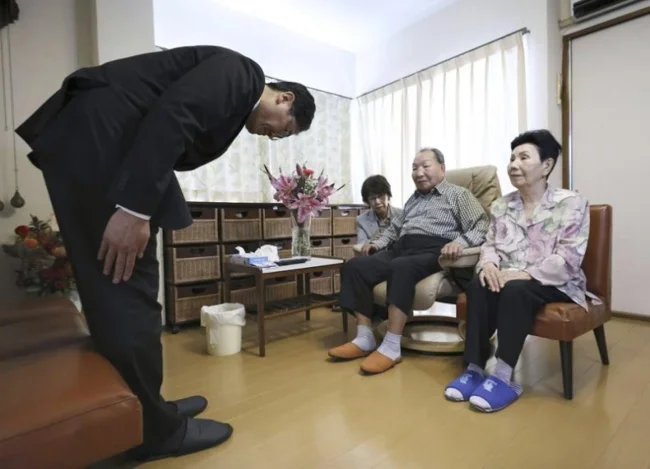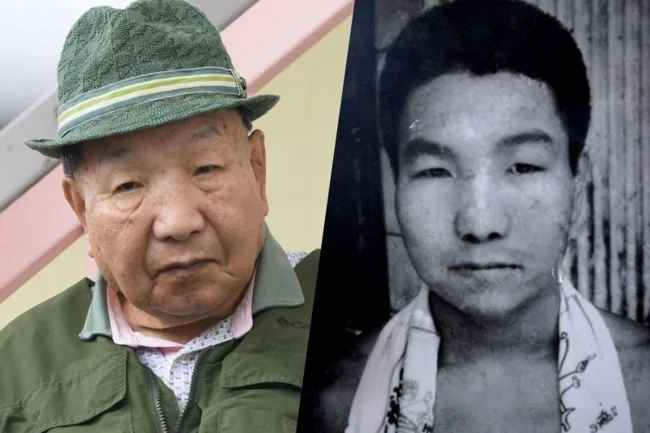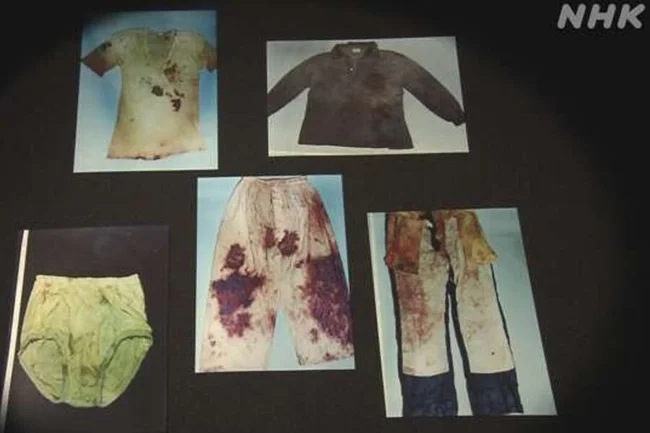In Japan, the police chief apologized to a man for the years of his life lost in prison (3 photos + 1 video)
Category: Interesting photo stories, PEGI 16
24 October 2024
The police chief of Shizuoka Prefecture in Japan has apologized to a man on death row. The man spent many decades in prison until a court found him innocent. 
A murder case that had been investigated for more than half a century was recently closed in Japan. In the 1960s, a local boxer was sentenced to death for the brutal murder of a family of four. However, it turned out that his confession was beaten out of him during “inhumane” interrogations, and the evidence was planted. The man had been awaiting execution on death row for 46 years. The city's police chief personally came to his home to apologize.
In Japan, former boxer Iwao Hakamada was recently acquitted, who had been on death row for the longest time in the world — 56 years. The outcome of the case was reported by the Japanese newspaper Asahi Shimbun.
Hakamada was sentenced to death in 1968 for the murder of a family of four, including two teenagers. At the time, the man was 30 years old, and from the first days of his arrest, he insisted on his innocence and said that they were trying to set him up. During his imprisonment, the suspect spent a record time on death row — 46 years.
Hakamada is now 88, and has been free since 2014 due to a review of his case. His long stay in prison left its mark on his psychological state, Japanese journalists note. It is difficult for him to communicate with people.

"The court sincerely regrets that this has taken so long," the judge said when acquitting Hakamada. He addressed these words to the man's elderly sister, Hideko, who was present at the hearing in her brother's place. After that, the woman burst into tears.
This is unique for Japan. This is the first time in 35 years that a defendant has been acquitted during a retrial after a death sentence. This is only the fifth such case since World War II.
Admit that you are guilty
The murder that Hakamada was accused of took place in the city of Shizuoka in 1966. At night, someone broke into the house of the director of a local miso paste factory and stabbed him, his wife, and two children: a 17-year-old daughter and a 14-year-old son. The family also stole money, about 200,000 yen (about $550). The building itself was set on fire, and the bodies were found in the morning. All four had stab wounds to the chest and other parts of the body.
The police immediately took the employees of the murdered man's factory, where Hakamada worked, under suspicion. By that time, he had already finished his boxing career (he was ranked sixth in his weight category) and became a simple worker. During the fire in the director's house, the man helped put out the fire. 49 days later, he was detained on suspicion of murder. The former athlete cut his hand in the fire, and pajamas with the same blood type as one of the victims were found in his room.
After the arrest, investigators pressured the suspect to confess to the crime. In its final ruling, the court found that the interrogations were "inhumane" and caused Khakamada "mental pain." They lasted for about 12 hours every day; journalists later found some of them in police archives and published the transcript.
"You are guilty. There is no doubt about it. You killed four people and burned them. People who did not resist... Cry, try to cry," four investigators took turns persistently accusing the man.
On the 20th day of detention, Khakamada pleaded guilty. He later retracted this testimony at the first trial. One of the three judges who sentenced him to death admitted after his dismissal that he had always believed in the man's innocence, but could not convince his colleagues.
Five pieces of evidence from a vat of miso
In addition to the confession that was forced out, the police used evidence: five bloody items of clothing were found in the vat of miso. The pants among them did not even fit the suspect, but the investigation stated that these were his clothes, which were simply deformed due to the miso. These items will be the mainstay of the prosecution. Only the last court established that the evidence was planted, and they do not prove Khakamada's guilt.

"If the evidence was fabricated, who did it?... The statute of limitations has expired. "There was no investigation to find the real culprit, making it extremely difficult to establish the truth," the Asahi Shimbun notes.
While in prison, the convict wrote letters to his family, "as if to stay alive," the publication describes. Hakamada's case became very famous in Japan, he was called a "broken boxer" and public movements were organized in his defense. This helped to achieve a retrial.






















